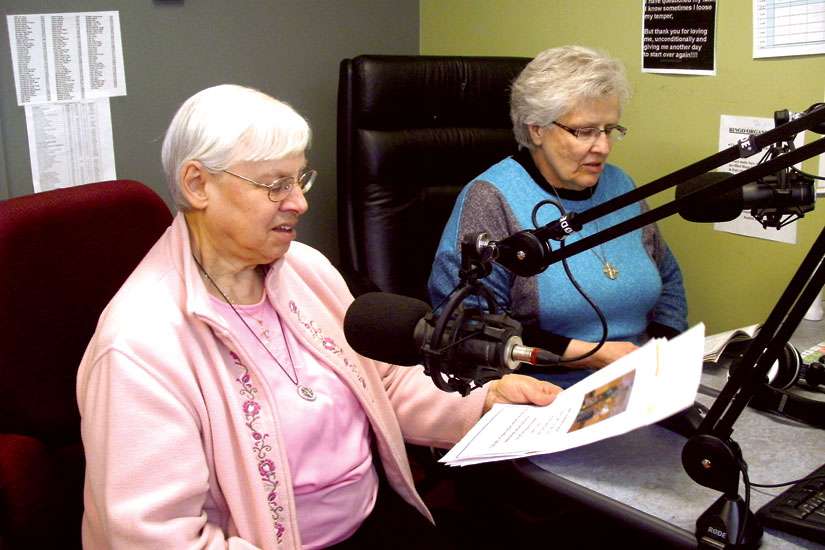It’s where Sisters Joan Liss and Pauline Girodat have called home and ministered for the past 12 years. Part of their ministry in the vast, isolated region of forest and tundra is to bring the widespread Catholic community together.
The two School Sisters of Notre Dame have been taking to the airwaves to accomplish this. Each week, the sisters host Church Hour, a radio program that got its start when Liss and Girodat were approached by local station CBQE soon after they arrived at the Fort Good Hope mission.
“That’s been a blessing for us, to communicate with the people here,” said Liss, who has spent the past two decades working in the Northwest Territories.
“We pray for various intentions, we read the Sunday Gospel and they get the Sunday reflection in case they weren’t at Church,” she said with a laugh.
The live broadcast also includes local announcements, inspirational stories and, on occasion, special guests.
“We also use it as a kind of teaching and information time,” she said.
It’s a radio program that has proven to be indispensable to local Catholics, as most communities only get intermittent visits from a priest.
“In a small community, people don’t have opportunities to go out and listen to lectures and take mini-courses,” said Liss. “They just don’t have access to that sort of thing. We can talk about some of the latest teachings of the Church or practices or what’s going on in the Church, so it’s an educational, spiritual uplift for the people.”
The program also makes the Church more accessible for homebound elders who might not be able to venture out.
From the feedback she receives on the radio broadcast, Liss knows a fair number of people tune in every week.
Liss and Girodat’s ministry goes beyond the airwaves. The sisters spend a lot of time “being present for the people.”
“We get a lot of phone calls from people who just want to talk,” said Girodat. “When there’s a person who is very sick, we’re called to go pray with them or to bless their house or if they’re feeling upset about something — things like that.”
The sisters are there for the 675 Catholics in Fort Good Hope and do outreach to the communities of Deline, which has 550 Catholics, and Colville Lake and its 100 Catholics.
And since there’s no priest in the community, the sisters do their best to ensure the Sunday lay-led service is of good quality.
“We want them to feel it’s worthwhile for them to come to church and participate and get spiritually nourished in some way,” said Liss, who also does sacramental prep as needed.
But their work is also focused on being there for the poor.
“When I say poor, it doesn’t always mean monetarily poor. It’s not everybody, but there’s a poorness because of alcohol and drugs,” said Liss. “There’s a poorness because of the residential school system. The people in this community have been strongly affected by the residential schools.”
The challenge, she explained, is a lack of parenting skills from generation to generation, since those children removed from their homes didn’t have parental role models.
“You see little improvements and you rejoice in them because you know there’s hope,” said Liss. “The name of this place is well named, Fort Good Hope, because there is hope here. The important thing is to help them live and move on and try to find positive ways of doing things.”
From Girodat’s perspective, the slower pace of life is just one of the enjoyable parts of living up north.
“The beauty of nature here is something that you don’t get elsewhere. The change of sunlight and dark and the snow that’s so white for so long and seeing the fox play with dogs.”
For Liss, a highlight can be both a joyful or a painful time.
“There’s been a lot of tragic deaths since we’ve been here and it’s just knowing we’re an assistance to the people… And I think for me, sometimes, it’s to be able to sit back and say ‘thank you Lord for allowing me to walk with these people at this time.’ ”
(Santilli is a writer in Toronto.)
Call to Service: Catholic Register 2015 Special Feature
- Christ remains at heart of religious life, by Michael Swan, The Catholic Register
- Congregation de Notre-Dame sisters reach out online to show value of consecrated life, by Jean Ko Din, The Catholic Register
- Nun's quest for renewal lands her in Ireland, by Evan Boudreau, The Catholic Register
- Nun has found her happy place, by Vanessa Santilli, Catholic Register Special
- In remote Arctic towns, radio connects Church with local Catholics, by Vanessa Santilli, Catholic Register Special
- The Grey Nuns played an integral role in Alberta's Church, by Lasha Morningstar, Canadian Catholic News


